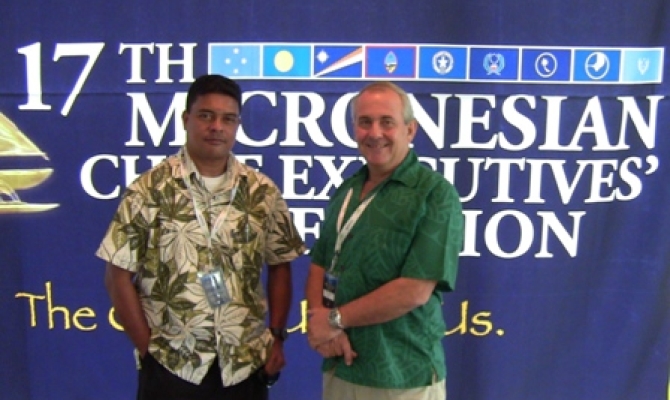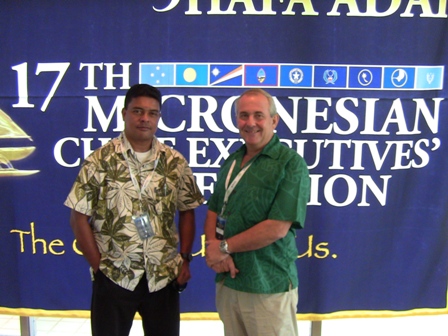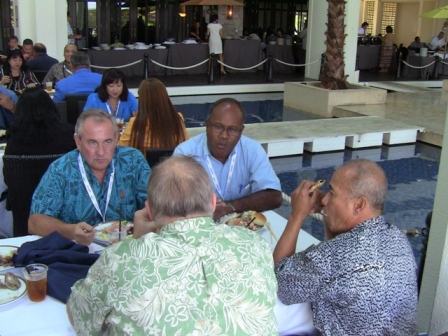
28 March 2012 - THE 17th Micronesian Chief Executives' Summit wrapped up with a series of presentations on regional economic development, tourism, and preservation of natural resources and climate change.
The Secretariat of the Pacific Regional Environment Programme (SPREP) attended the high level event hosted in Guam this year, raising further awareness on the Pacific Adaptation to Climate Change Project.
In 2011 PACC was first endorsed at the summit in the Federated States of Micronesia, this led to plans for a PACC committee to be formed under the Micronesian Chief Executives' Summit for which a progress report of the regional project is to be made at each summit.
The Director-General of SPREP, Mr. David Sheppard, attended the 17MCES with the Pacific Adaptation to Climate Change Coordinator from the Federated States of Micronesia, Mr. Abraham Simpson [pictured right].
"We are grateful the Chief of Executives of Micronesia has welcomed the Pacific Adaptation to Climate Change Project," said Mr. Sheppard.
"Our members are vulnerable to the effects of climate change and the interest of the Chief Executives of Micronesia is a positive move as the PACC project brings about activities on the ground in 14 Pacific island countries. These are actual adaptation projects driven by a country committee to make real changes and bring help to local communities."
PACC is a multi-million dollar project that has projects across the region to help build national capacity to adapt to climate change in one of three issues; food security and food production, coastal management and water resource management.
The Federated States of Micronesia, Marshall Islands and Palau presented a paper on PACC which was adopted and is reflected in the final communiqué of the 17 MCES.
"This summit did more than just bring the leaders together to discuss issues; it has really helped establish personal ties with one another," said Simpson Abraham.
"We all agree on the need to move forward with definite solutions and adaptation options for climate change, real and practical plans of action to bring more climate change adaptation opportunities to the region and our people."
Governor of the Commonwealth of Northern Mariana Islands, Hon. Benigno R. Fitial drew attention to the issue 
He noted that after Federal Regional Council meeting, he joined Governor Tulafono of American Samoa in a meeting with a group of coral reef scientists to provide a consensus statement regarding the implications of climate change on coral reefs.
"They are reaching out to us as Leaders of the Pacific Islands to work together in an effort to come up with viable solutions. As Chief Executives it is important for us to put forward a call for action against large carbon emission producing nations to curb contributions to climate change which impact our island communities," stated Governor Fitial.
The governor added that as first-hand witnesses to the effects of climate change, it is tremendously important for the chief executives to recognise that climate change is underway and that it will have a significant impact on the world's coral reef systems.
"With very minimal built infrastructure and population size, our small island nations remain insignificant contributors to carbon emissions, yet we are the most vulnerable to the effects of climate change," lamented Fitial.
"The days of environmental exploitation are long past and the time to act is now."
"We were able to have a candid discussion about the issues facing our communities with respect to the impacts of Climate Change. We talked about the need to address some adaptation options and a way forward for our leadership to react now," Abraham said.
The PACC Project consists of 14 member countries; it is implemented by the United Nations Development Programme (UNDP) in partnership with the Secretariat of the Pacific Regional Environment Programme (SPREP). It is funded by the Global Environment Facility (GEF) and the Australian Agency for International Development with support from United Nations Institute for Training and Research (UNITAR) Climate Change Capacity Development (C3D+) Programme.
Click here to read the full report of the Pacific Adaptation to Climate Change (PACC) Project to the 17th Micronesian Chief Executives' Summit.
Click here for more information on the 17th Micronesia Challenge Executive Summit in Guam.
Click here for more information on the Pacific Adaptation to Climate Change Project.